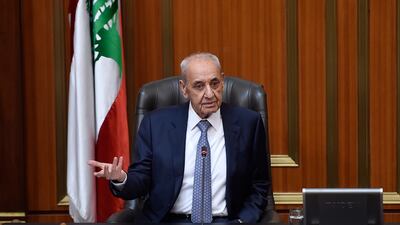Lebanon's parliament has failed for a second time to elect the country's next president, with not enough MPs present to reach the quorum.
Speaker Nabih Berri adjourned the house until October 20, less than two weeks before the term of incumbent Michel Aoun expires.
With a consensus candidate yet to emerge, the prospect of a presidential vacuum looms. An attendance of two thirds — or 86 MPs ― in the 128-seat Parliament is required to meet the quorum. But only 71 were present in the deeply divided chamber on Thursday.
This is the second time that MPs have failed to elect Lebanon's next head of state after no clear winner emerged during a vote at an initial session on September 29.
On that day, MP Michel Moawad, whose father Rene served as president for 18 days in 1989 before being assassinated, received the most votes, with 36. He was mainly backed by a grouping of MPs who are critical of Iran-backed Hezbollah, the armed group and political party that has significant sway in Lebanon.
“We are ready at any time to elect a president but it is clear today that several parties are not ready for the presidential election because of differences,” said Georges Adwan, a senior MP in the Lebanese Forces party.
The LF, a staunch critic of Hezbollah, supported Mr Moawad in the last round.
In the first polling round, a two-thirds majority is required to win. But only an absolute majority is needed in subsequent votes.
The failure to find a successor to Mr Aoun, 89, in the first two rounds was not unexpected and has precedent — it took 46 sessions and 29 months for parliament to elect the former army commander in 2016.
In the country's confessional system, the presidency is always reserved for a Maronite Christian.
Among the key factions absent from Thursday's session were the 17 MPs from the Free Patriotic Movement (FPM), the party founded by Mr Aoun and led by his son-in-law Gebran Bassil.
Mr Bassil justified his party's lack of attendance by saying the session was scheduled on an important day for the FPM. On October 13, 1990, Mr Aoun — then serving as the commander of the Lebanese Army — was ousted from his base at the presidential palace in Baabda by Syrian forces.
“Some people betrayed this date and did not respect the commemoration,” Mr Bassil said.
Only of a handful of the 13 MPs from Hezbollah were present. Hezbollah MP Hasan Fadlallah said Mr Moawad's candidacy would “not lead to any results”.
If parliament fails to decide on Mr Aoun's successor before his term ends, the government will assume presidential powers.
However, the government itself is in a caretaker capacity, adding to the political paralysis. Najib Mikati was named prime minister-designate in June, a month after parliamentary elections, but political factions have not yet agreed on the distribution of portfolios in his Cabinet.
Lebanon is facing a financial crisis described by the World Bank as one of the worst in modern history, with the local currency plunging in value by more than 95 per cent over the past three years.
There are severe shortages in basic goods such as bread, water, electricity and medicines.









